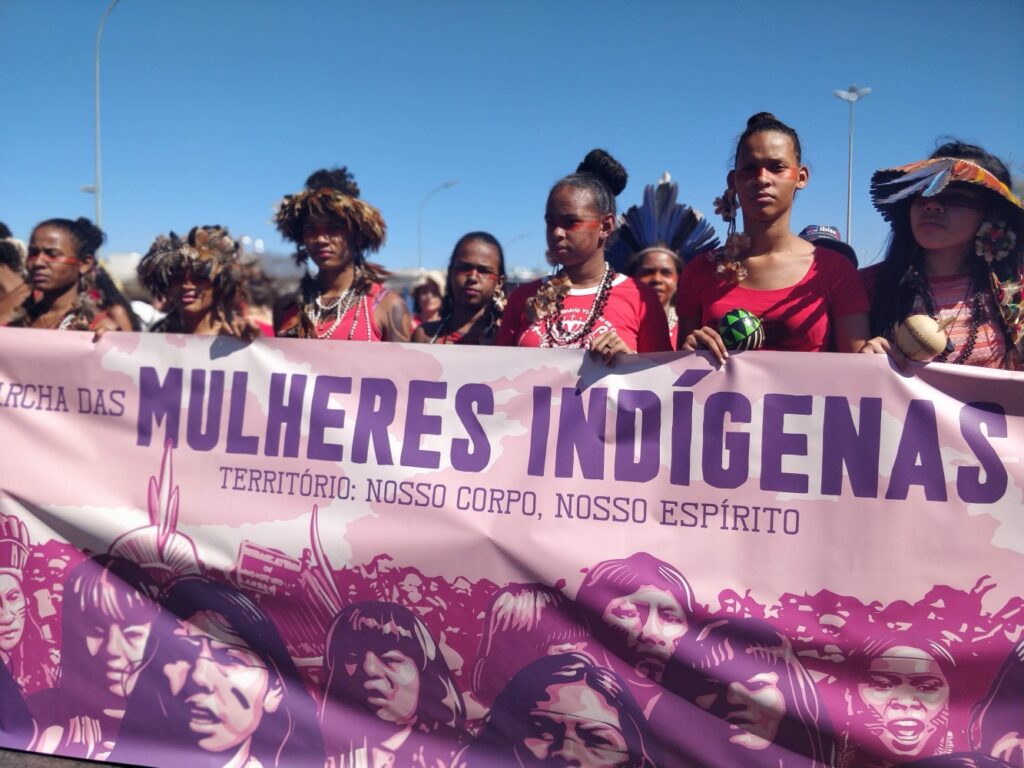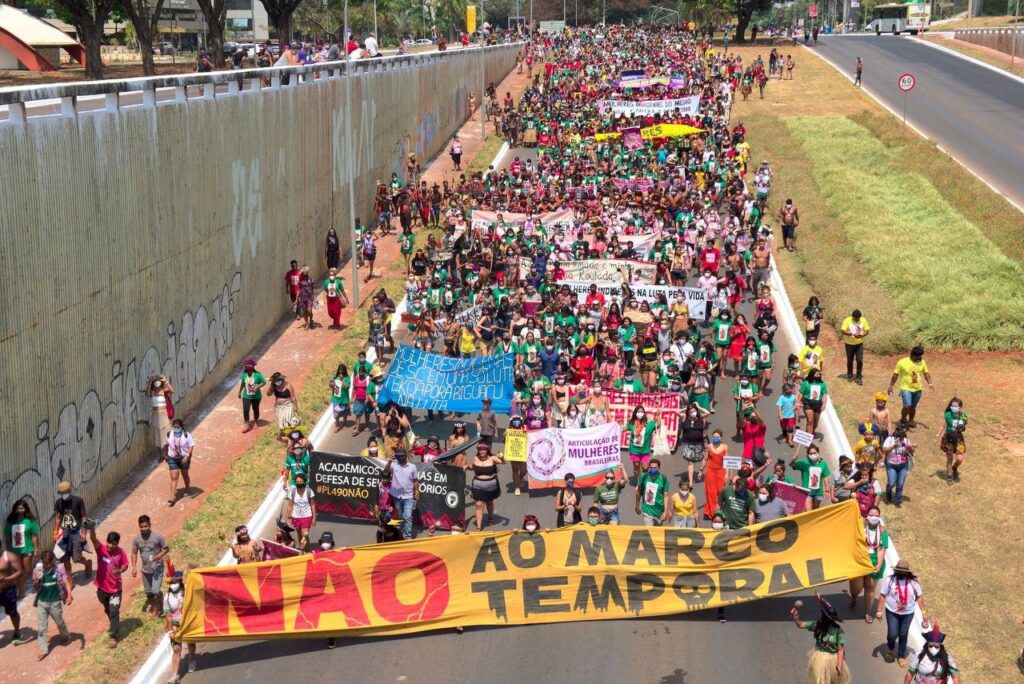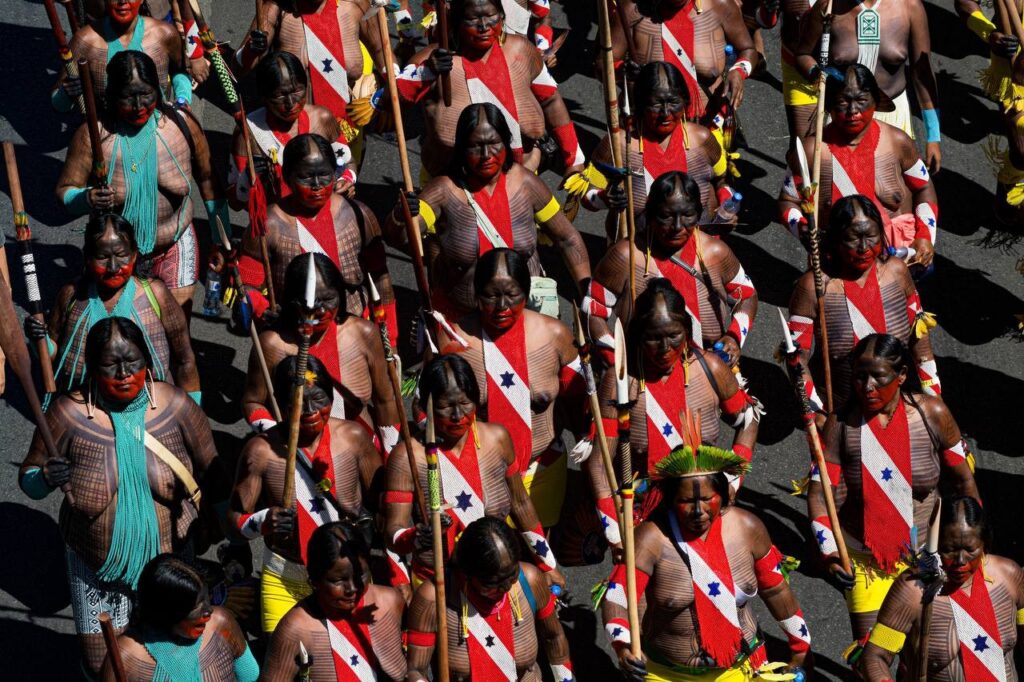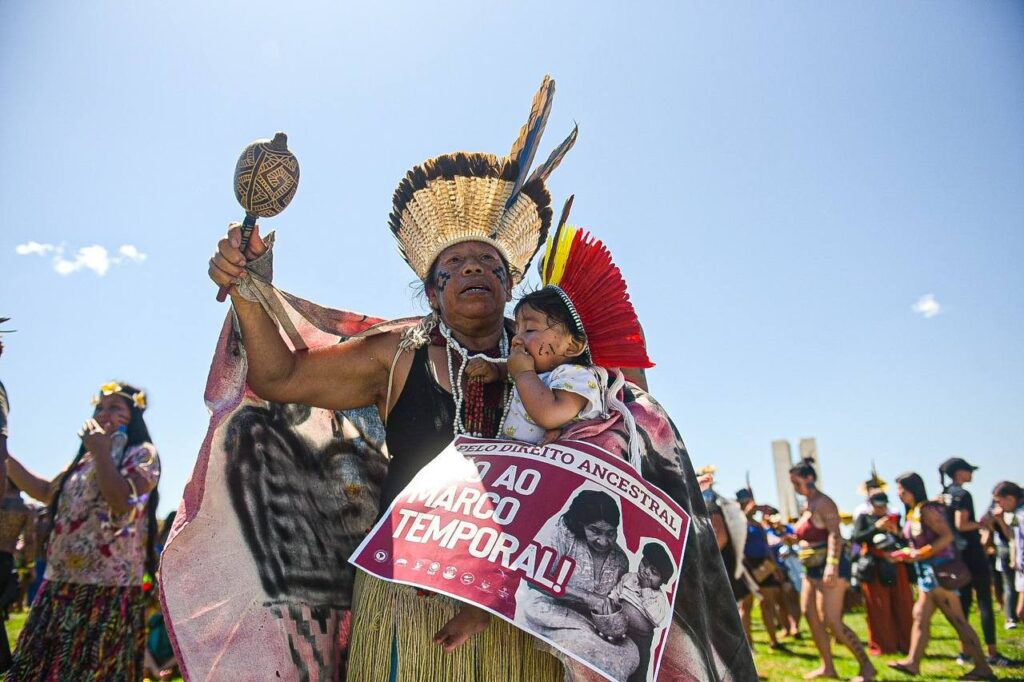October 4, 2023
This blog was originally written in Spanish and automatically translated using artificial intelligence.
The National Articulation of Indigenous Women Warriors of Ancestrality (ANMIGA) was born as an organic space for action led by Indigenous women from all over Brazil in April 2019. During the large Campamento Terra Livre, organized by the Articulation of Indigenous Peoples of Brazil (APIB), a group of women came together around a platform of community leadership, political influence, and global reach.
ANMIGA was born as a cry for the survival, existence, and resistance of Indigenous women—and with a clear, collective, and global call for a political, spiritual, and environmental revolution capable of producing new relationships of solidarity between people and nature.
“We are seeds sown through our songs for social justice. Women of the land, women of water, women of biomes, women of spirituality, women of trees, women of roots, women of seeds—and not only women, but warriors of ancestrality.”
On August 9, 2019, four months later, ANMIGA convened the 1st March of Indigenous Women on the International Day of the World’s Indigenous Peoples. Aiming to carry out an action with national impact, Brasília welcomed more than 2,500 women from 130 Indigenous peoples under the slogan “Territory: our body, our spirit.” The march joined the Marcha das Margaridas, where over 30,000 Indigenous, quilombola, riverside, and other traditional women marched together for their rights, against violence and racism.

March of Indigenous Women of Brazil, 2019. Credit: TINTA
“We, Indigenous women, are also the Earth, because the Earth is made in us. Through the power of song, we are connected to all the places where our ancestors are present. The Earth is a sister, a daughter, an aunt, a mother, a grandmother, a womb, food—it is the cure for the world.”
In 2021, in response to rising anti-Indigenous policies and the violence and invasions suffered in their territories, Indigenous women called for the 2nd March of Indigenous Women with the slogan “Reforesting minds to heal the Earth.” Despite COVID-19, distance, and threats from extremist, fascist, and armed groups supported by the government, the women celebrated life and sang for social justice, for territorial demarcation, for forests to remain standing, for health, for education, to stop climate change—and for the healing of the Earth.

March of Indigenous Women, 2021. Credit: Alass Derivas
With the belief that the Earth is Mother, and that Indigenous women play a fundamental role in life and survival, the march is a call to humanity—an invitation to all the peoples of the world to engage in a new way of relating to Mother Earth and all living beings.
If reforesting minds means planting new ideas that can heal, regenerate, and give life to our actions in a way that protects ecosystems and life itself, then reforesting politics means building laws and norms that are inclusive, anti-colonial, and place Indigenous women at the center of political leadership. On that occasion, 5,000 Indigenous women from 172 peoples and 6 biomes camped in Brasília—and in the minds of people all over the planet.
“Caring for Mother Earth is ultimately caring for our own bodies and spirits. The body is the land. The forest is the mind. Reforesting our minds means caring for our body-land.”
In 2022, it was time to return to the roots and territories. A caravan, one of the “Originals”, traveled across the country for a full year, promoting actions to strengthen individuals and communities, collecting stories, and carrying messages of strength and unity. Above all, the caravan sought to reforest politics and elevate the candidacies of Indigenous women, reimagining a Brazil that is politically inclusive and truly representative of its diversity. The movement grew stronger, adding and converging more voices, knowledge, traditions, and a shared will to protect life in all its forms—generating political initiatives from Indigenous women, for Indigenous women.

March of Indigenous Women of Brazil, 2022. Credit: TINTA
United and organized, they call themselves Women of the Earth, the representatives of each Brazilian biome and members of ANMIGA’s executive coordination; Women of the Roots are the leaders elected to represent their territories at the state level; Women of the Seed are the leaders elected to represent their territories at the local level and last but no least the Women of the Water are the leaders elected to represent ANMIGA internationally.
In just a short time, ANMIGA was responsible for a massive campaign that led to the election of three Indigenous women to Congress. With 17 Indigenous candidacies for federal and state offices, the historic victories of Célia Xakriabá as federal deputy and Sonia Guajajara first as deputy and later as Minister of Indigenous Peoples brought ANMIGA into the Bancada do Cocar (the headdress caucus). ANMIGA has since strengthened its mission to act with its own narratives across multiple arenas, defending Indigenous women—emphasizing their voices through institutional political representation.
“We are many. We are multiple. We are thousands: women, chiefs, midwives, witches, shamans, farmers, teachers, lawyers, nurses, and doctors in the many sciences of the Territory and the University. We are anthropologists, parliamentarians, and psychologists. We are many, moving from the ground of the village to the ground of the world.”
Despite countless challenges and injustices, Indigenous women refuse to be silenced. In September 2023, they convened the 3rd March of Indigenous Women with the slogan: “Biome women in defense of biodiversity with ancestral roots.” At the heart of this march is a powerful call for equal rights for Indigenous women. 8,000 women from 200 Indigenous peoples took part in the activities in Brasília.

March of Indigenous Women, 2023. Credit: Alass Derivas
The march demanded access to quality healthcare, education, and economic opportunities; protection of land and natural resources; and an end to violence against Indigenous women—a widespread issue that has affected communities for generations. The message is clear: it’s time to end the cycle of discrimination and reclaim their rightful place in society.
The march aimed to connect and reconnect with the power of ancestral voices to strengthen the work of Indigenous women, reflect on their challenges, and propose new dialogues to influence politics in the fight for justice and equality. Crossing borders with deep determination, ANMIGA once again placed Indigenous women at the center of the world—honoring generosity and ancestral wisdom, and reminding humanity that “The fight for Mother Earth is the mother of all struggles.”
“The fight for Indigenous women’s rights is far from over—but with every march, every protest, and every united voice, progress is being made. And as long as there are brave women standing together, the flame of hope will never die.”